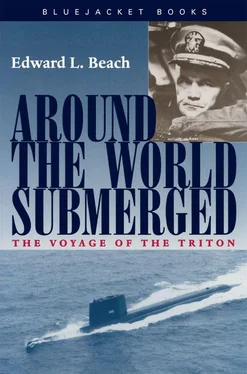In the control and living spaces, the ship has quieted down, too. Orders are given in low voices; the men speak to each other, carry out their normal duties, in a repressed atmosphere. A regular pall has descended upon us. I know that all hands are aware of the decision and recognize the need for it. Perhaps they are relieved that they did not have to make it. But it is apparent that this unexpected illness, something that could neither have been foreseen nor prevented, may ruin our submerged record. If the Macon cannot meet us, if we have to go into the port of Montevideo to transfer Poole to medical authorities, we shall have to surface. We shall still, in that event, continue the cruise, for this would affect only our incentive factor. But that would be a big loss.
Naturally, there was no mention in the Log of any overriding reason, other than our perfectly understandable desire for the trip to be entirely submerged all the way.
As we raced north, I gave a great deal of thought to what we should do when we reached Montevideo. There was the possibility that Poole would have another remission, and, in fact, there was always the possibility that this third attack would be his last. We would have a day and a half to find out, and it might even be possible, if Macon couldn’t come to the requested rendezvous, to stretch things another few hours and wait and see. But I couldn’t, in my heart, give much for our chances of not having to surface and enter port, if Macon could not get to us.
On the other hand, if Macon did meet us, we had a fighting chance. We could “broach” the ship—that is, get the upper part of the conning tower out of water—and convert the conning tower itself into a big airlock. Triton’ s pressure hull and superstructure would remain entirely submerged. Only the upper part of the sail and part of the conning tower would in fact broach the surface—a maneuver submarines have performed for years—and this critical part of the ship would have been previously sealed off from the rest. Poole and the transfer party would be inside the conning tower, would be called to the bridge when Macon’ s boat approached, and transfer across with ease.
The big “if” was the Macon. There was no doubt that she could do the job. The question was whether she was where I thought she was.
That night I wrote in the Log:
2300 Periscope depth. Maybe there will be a message for us—there could be, though it is probably too soon….
2325 There is, indeed, a message for us from Admiral Daspit. Admiral Stephan is getting underway in the Macon and will meet us at the time and place we have requested.
For the second time in as many days a lead weight has been rolled off my chest. The news is immediately announced to the entire ship and at the same time we can now announce how we shall handle the rendezvous and transfer. We will not surface, at least, not fully.
All during that long day, Jim Stark and his Hospitalmen took turns keeping watch on Poole. His appearance was shocking. His face was swollen, eyes puffed up and half-shut, tears running down his nose and cheeks. He groaned continuously, sometimes in a low whimper, sometimes with startling loudness. From previous experience and Jim Stark’s warnings, I knew that he had been pretty heavily loaded with sedation and was in fact totally out of his head. In a way, I had by now become steeled to Poole’s expression, for apparently he had no recollection of the excruciating pain of his previous two attacks. But I became acutely conscious of the uncomfortable gazes and averted eyes of Poole’s worried shipmates. During his first attack, I had thought of moving him somewhere, and similarly during the second. But Triton had no sick bay; outside of making it easier for Meaders, Fickel, Gladd, and Chief Williams, our four Hospitalmen, plus Jim Stark, all of whom were taking turns watching over Poole, the only other people who would really benefit from our setting up a sick bay would be those men who had to berth in the same area.
There was only one place in the ship which could be used for such a purpose without displacing a number of other people, and where, besides providing room for the medical equipment needed, Poole could be out of sight. The additional privacy would certainly mean nothing to him in his condition, but it would be highly desirable from the point of view of the rest of the men. After thinking it over, I gave orders that this time he be moved into my bunk. It proved to be a good decision, whatever else resulted, for it certainly demonstrated the truth of the adage that “out of sight, out of mind.” Everyone perked up once Poole’s sufferings were removed from public gaze, and we became positively cheerful after receipt of the Force Commander’s encouraging message.
There were a number of preparations we had to make for the rendezvous. It would, for example, be necessary to communicate with Macon by short-range, ultra-high-frequency radio. Should our UHF antennas be out of commission because of their already prolonged submergence, which was a distinct possibility, some sort of stand-by system would be necessary. Years ago, in Amberjack, we had experimented with using the periscope to transmit messages at night by the traditional flashing-light technique. Now, I directed that a flashing light be rigged up for use in the periscope. It would work, I assured the slightly dubious quartermasters. Later on, I happened to overhear the irrepressible Bill Marshall telling his crew, “Listen you guys, did you ever hear of the charge of the light brigade? The old man says we’re going to send blinker signals through the periscope, so we’re going to send blinker signals through the periscope. Don’t waste your time figuring it out!”
The metaphor was not exactly apt, for several obvious reasons, but I knew the gadget would work; so I chuckled inwardly, as I pretended not to have heard.
Another problem was that I did not know what instructions had been given to the Macon, other than to rendezvous with us and pick up a sick man. Her crew would probably be ashore in Montevideo on liberty immediately afterward and might be indiscreet. George Sawyer pointed out that the ship’s identification numbers were painted in big white numerals on the side of our sail and would be visible to the Macon and her boat’s crew when it came alongside. News of Triton’s presence so close to shore was bound to create intense interest in the city, should it become known.
We had no paint below decks, but there was some in a watertight tank in the sail. While we were awaiting the Macon’s boat, it was decided, a crew of men would hastily attempt to blot out the numbers with paint.
And, of course, there was Poole himself. He would have all identification removed and would have all the necessary papers attached to his person in a sealed packet to be delivered only to the Commanding Officer of the Macon. Included among them would be a request that he be segregated from the crew and protected from curious questioners. If he were to have a remission prior to the transfer, we planned also to spend some time briefing him, but if not, these provisions would satisfy the situation.
In describing the transfer of Poole to the Macon, which took place early on the morning of the fifth of March, 1960,1 could not do better than to repeat verbatim the entries I wrote in the ship’s official report of the incident.
Our rendezvous with Macon is for 2 A.M. At 0100 we slowed and came to periscope depth. Macon is out there waiting for us.
The rendezvous is perfect. She is heading south, we north, and the two ships meet at the designated position.
I was pleased to find that our UHF radio worked perfectly, despite the fact that it had been long under water and subjected to high speeds. Since we had built a gadget to signal through the periscope, however, I wanted to test it out. It was a dark night, with rain and poor visibility, but to my smug satisfaction and the expressed surprise of three quartermasters in the conning tower, we found ourselves able to exchange calls perfectly with the Macon. We had rigged a light inside a tin can with a wire and a sending key attached to it. By focusing the periscope directly on the Macon and holding the tin can tightly against the rubber eyeguard, we found it possible to send a perfectly readable signal to the bridge of the other ship.
Читать дальше












